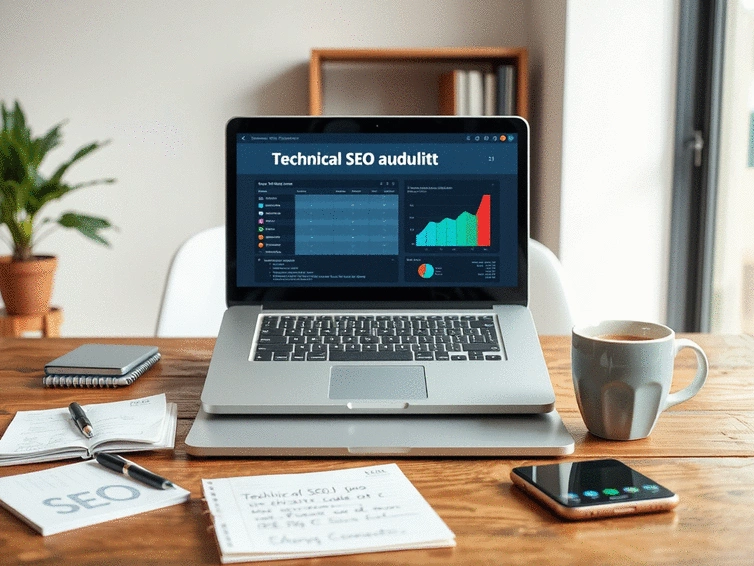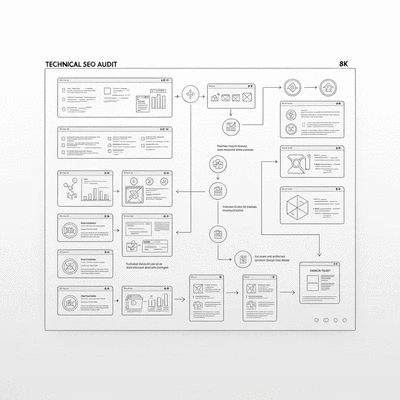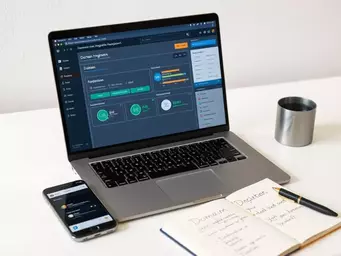1. Initial Audit & Identification
- Crawlability Assessment
- Indexing Analysis
- Site Speed Evaluation
- Mobile Usability Check

In an era where user experience dictates online success, a well-executed technical SEO audit could be the key to unlocking your website's potential. Are you ready to learn the secrets of optimizing your digital presence?
A technical SEO audit isn't a one-time task but a continuous process. This visual breaks down the essential steps from audit to ongoing optimization.
As we dive into the evolving landscape of digital marketing, understanding the significance of a technical SEO audit is more crucial than ever. In 2025, search engines are focusing on user experience and site performance more than before. A thorough audit can pinpoint areas where your website may be falling short, ultimately impacting your visibility and search rankings. For a deeper understanding of SEO fundamentals, you can refer to the Google Search Central documentation.
For anyone starting their online journey, like many of my clients at All for Domains, it's essential to prioritize technical SEO. This isn’t just a task for seasoned professionals; it’s a fundamental step for beginners who want to take their online presence seriously. So, why should you care? Let's break it down!

Technical SEO audits provide insights that can significantly affect your website's performance. If you’re a beginner, understanding the basics can save you time and resources in the long run. Here are a few reasons why you should prioritize this aspect of SEO:
By embracing technical SEO audits, you set a solid foundation for your online presence. Remember, the sooner you start, the sooner you’ll see the benefits!
Understanding how technical audits affect your website's performance is key to mastering SEO. These audits can lead to improvements in several critical areas, including:
As I often tell new entrepreneurs, a well-executed technical SEO audit can lead to better rankings, more visitors, and ultimately more conversions. It’s about creating an online environment where users can easily find and engage with your content. To further aid in this process, you might find a comprehensive SEO audit checklist helpful for systematic evaluation.
Now that we understand the importance of technical SEO audits, let’s explore what a comprehensive audit should include. These components not only help you identify issues but also build a roadmap for improvements:
By focusing on these essential areas, you’re putting your website in a position to thrive in a competitive online marketplace. Dive into each component with intention, and you’ll set yourself up for success! For a general overview of technical SEO, you can consult the Wikipedia page on Search Engine Optimization which includes a section on technical SEO.
Did you know? Regularly conducting a technical SEO audit can not only improve your site's performance but also keep you ahead of algorithm updates. Make it a habit to review your site every few months, ensuring you adapt to any changes in SEO best practices.
A: A technical SEO audit is a comprehensive evaluation of a website's technical aspects that affect its search engine ranking. This includes checking for crawlability, indexing issues, site speed, and mobile usability to ensure optimal performance.
A: Technical SEO audits are crucial for beginners because they lay a solid foundation for online presence. They help improve visibility, enhance user experience, and identify critical issues like broken links or slow load times, saving time and resources in the long run.
A: The key components include crawlability assessment (ensuring search engines can access your site), indexing analysis (verifying pages appear in search results), site speed evaluation (measuring loading times), and mobile usability checks (assessing performance on mobile devices).
A: After an audit, you should prioritize and implement the recommendations. Focus on high-priority items like fixing crawl issues, optimizing page speed, enhancing mobile usability, and updating XML sitemaps. Continuous monitoring is also essential to track performance and adapt to changes.
A: Technical SEO is an ongoing process. It's recommended to conduct regular audits every few months to adapt to algorithm updates and maintain your competitive edge. Continuous monitoring of performance metrics is also vital.
Congratulations on completing your technical SEO audit! You're already ahead of the game in optimizing your website. Now, let's talk about the next steps to ensure that your hard work pays off. Implementing the recommendations from your audit is crucial for enhancing your site's performance and visibility in search engines.
First, prioritize the issues identified during your audit. Not all recommendations will carry the same weight in terms of impact on your SEO. Focus on the high-priority items, such as fixing crawl issues, improving site speed, and enhancing mobile usability. This targeted approach ensures that you address the most critical aspects first.

Once you've identified your priorities, it's time to take action! Here’s a simple checklist to guide you through the implementation process:
Implementing these recommendations can significantly boost your site's SEO performance, leading to better visibility and engagement! Remember, each change you make should be monitored to assess its impact.
After implementation, continuous monitoring of your website is vital. SEO isn't a one-time task; it's an ongoing process that requires regular checks and adjustments. Tools like Google Analytics and Google Search Console can provide valuable insights into your website's performance.
As you monitor, pay close attention to user engagement metrics such as bounce rate, average session duration, and pages per session. These metrics can offer insights into how well your audience responds to your updates. If you notice any significant changes, be ready to adapt and optimize further!
User engagement metrics are your compass in the vast digital landscape! By analyzing how visitors interact with your site, you can make informed decisions about what works and what needs improvement. For instance, a high bounce rate might indicate that visitors aren't finding what they expected. This feedback can guide you in tweaking your content or layout for better engagement.
Moreover, as a lifelong learner, I encourage you to keep an eye on industry trends and algorithm updates. Staying informed will help you adjust your strategies accordingly and maintain your competitive edge!
As you continue your journey in mastering technical SEO, having the right resources at your fingertips is essential. At All for Domains, we believe in empowering our users with the knowledge they need to succeed. That’s why I’m excited to share some valuable resources that can aid your learning process!
Regular audits are critical for maintaining your site's health. Luckily, there are many interactive tools and templates available to streamline this process. Here are a few that I recommend:
By leveraging these tools, you'll be better equipped to conduct thorough audits and keep your site optimized!
Learning from others can accelerate your growth in SEO. There are many communities where you can seek support and share your experiences. Here’s where you can find valuable help:
Utilizing these resources not only enriches your knowledge but also connects you with like-minded individuals passionate about SEO. Remember, you're not alone on this journey!
Online forums are fantastic places to learn and engage with fellow SEO enthusiasts. They allow for real-time discussions and the sharing of tips from experienced professionals. Don’t hesitate to ask questions, share your audit experiences, or even seek feedback on your website!
As you dive deeper into technical SEO, keep nurturing your curiosity and stay proactive in learning. The digital landscape is ever-changing, and your commitment to growth will undoubtedly lead to success!
Here is a quick recap of the important points discussed in the article:
Domain Management Tools You Need

Every successful online venture starts with strong domain management. Are you ready to master the fu
Understanding Web Hosting Hidden Costs

Have you ever signed up for a service only to find out that the cost skyrockets after the first year
Understanding Uptime Guarantees in Hosting

What if a mere percentage could determine the success of your online presence? Understanding uptime
Domain Management Tools You Need
Understanding Web Hosting Hidden Costs
Understanding Uptime Guarantees in Hosting
Understanding Domain Names and SEO
Competitor SEO Analysis Made Simple